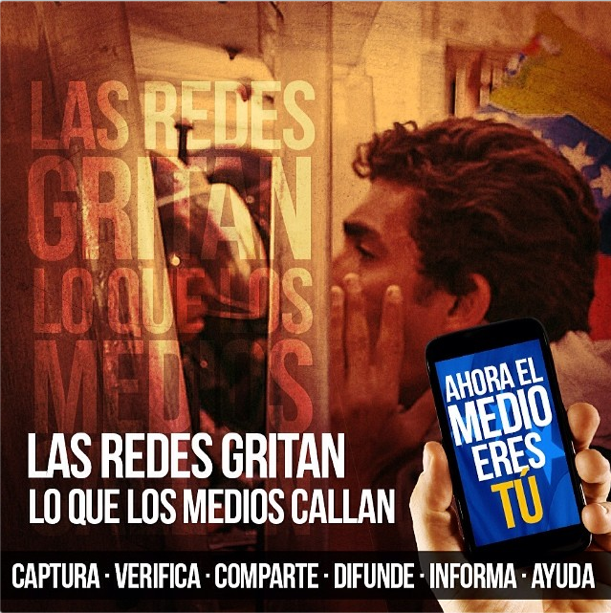[Links are to Spanish-language pages, unless otherwise noted]
The current information crisis in Venezuela, following a surge of protests [en] that mainstream media cannot cover under threat of fines [en] by the government, has compelled netizens to spread news through social media. However, not all users have been sufficiently transparent in their reporting of daily events, which has generated strong criticism about how useful digital media in the country really is.

“Social media calls out what the mainstream mutes” Image for the #ElMedioEresTu [The Medium Is You] campaign from @untalhector (Instagram).

Left: Denouncing the “repression” in Venezuela from the user @YACUBATWITEA. Right: Image originally published by Al Jazeera about protests in Chile in 2012.
Meanwhile, many Government supporters retweeted a photo of the gathering convened by President Nicolas Maduro in Caracas on February 15. In the background, the logo of a famous soft drink company can clearly be seen atop a building, an advertisement that was removed some four years ago. Ironically, the user who published the image on Twitter, the mayor of the Caracas municipality of Libertador Jorge Rodríguez (@JRodriguezPSUV) is also the man who gave the order to remove the logo in the first place:
#SomosEjercitoDePaz Mientras los fascistas intentan desestabilizar el país nosotros luchamos por la paz y la vida. pic.twitter.com/TmZHrwCl21
— Jorge Rodríguez (@JRodriguezPSUV) February 16, 2014
While the Fascists try to destabilize the country, we are fighting for peace and life.
Lucía Calderón, writing in Clases de Periodismo, also referred to a fake photo by a supposedly experienced journalist reporting an incident of abuse and violence by government supporters. It turned out to be the picture of a young Basque man tortured in Spain in 2006. Lucía recommeds:
Recuerda revisar estos consejos para certificar información antes de compartirla siguiendo este enlace.
Remember to follow the tips in this link to check the information before you share it.
There are other pages on Facebook such as Venezuela Sin Mentiras (Venezuela Without Lies), created in April 2013 after the presidential election to demonstrate this kind of media manipulation and urge users not to resort to practices that endanger everyone:
Reflexión: “NO CAER EN FALSOS RUMORES! calidad y veracidad en la información para que no estemos desinformados”
Think about it: “DON'T FALL INTO THE TRAP! quality and truth in information so we are not misinformed.”
In light of the situation, the satirical site El Chigüire Bipolar posted the story of an “Imbecil who shares a fake photo and confirms that there are a lot of ignorant people out there.” The fictitious character, Domingo Ugarte, shares a fake shot of student protests and the expected reaction in a series of retweets.
“La foto me llegó ayer como a las ocho de la noche. Era una imagen terrible, un policía con un traje negro que nunca había visto en Venezuela, maltratando a un estudiante en una calle que claramente no era acá. Pero no me resistí, tuve que darle retweet y compartirla al mundo. Todos tienen que ver el horror de lo que estamos viviendo y en el camino recibir demasiados RTs. Porque eso es lo arrecho, no importa si es una foto de un cangrejo gigante matando estudiantes, la gente se va a horrorizar y la va a compartir.”
The photo arrived at like eight o'clock last night. It was a terrible picture: a police officer with a black uniform that I had never seen in Venezuela mistreating a student in a street that clearly wasn't here. But I couldn't resist, I had to retweet and share it with the world. Everyone needs to see the horror that we are living through and get a few too many RTs along the way. Because that's the turn on; it doesn't matter if it's a shot of a giant crab killing students, people are going to be outraged and share it.”
There are currently a few independent awareness initiatives aimed at promoting responsible use of digital media, as described by Aglaia Berlutti, blogger and Global Voices contributor, in an article for Noticias Venezuela. Aglaia enumerates a series of tips and recommendations to help social media users become efficient purveyors of information:
No exageres, ni tampoco distorsiones el hecho que deseas transmitir. Redacta noticias sencillas sin incluir tu opinión o hipótesis no verificadas. […] La intención de tu post o de tu artículo es que pueda ser compartido todas las veces que se requiera y que todos tus lectores puedan comprenderte sin problemas.
Don't exaggerate or distort the facts you want to publicize. Draft straightforward posts without including your own or other unverifiable hypothesis. […] The goal of your post or article should be that it can be shared as often as needed and that all readers can easily understand it.
And Karelia Espinoza (@Kareta), political scientist and digital activist, shares a graphic about how to put together Internet reports:








5 comments
The grass roots must organize against these internationally supported opposition destabilization events. Money is the single most cunning enemy the people will ever encounter, and you must identify each pressure point and have a counter plan. Get involved in investigations, identify holdouts who will hoard products at opportune times. The whole palette must be considered, you will never beat an unfair opposition hitting above the belt only. Only use the unfair tactics against unfair tactics, but they must be considered against these attempts to purchase the government.
People will always jump to conclusions. It’s good to help everyone understand that some lies are spread through ignorance rather than malice.